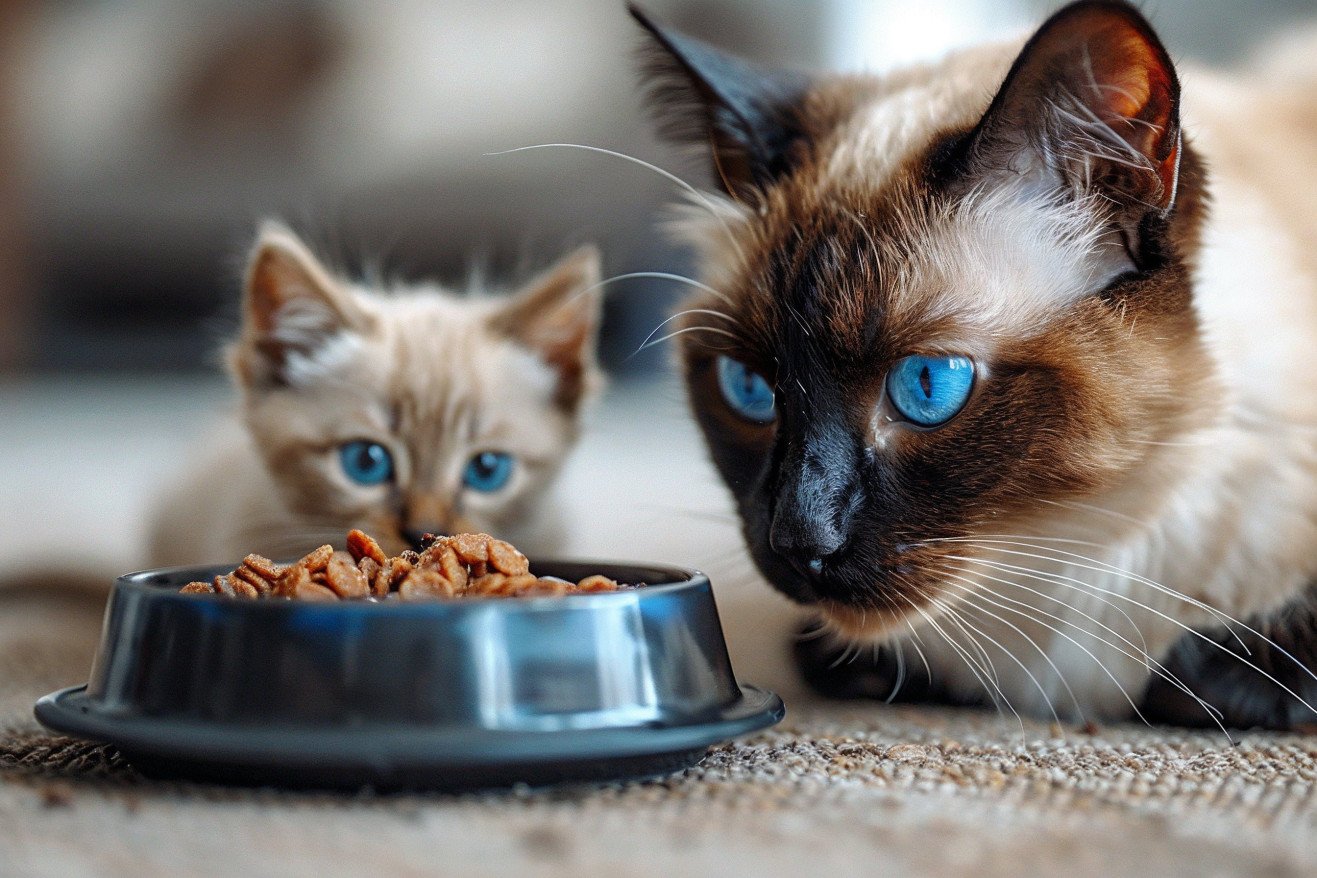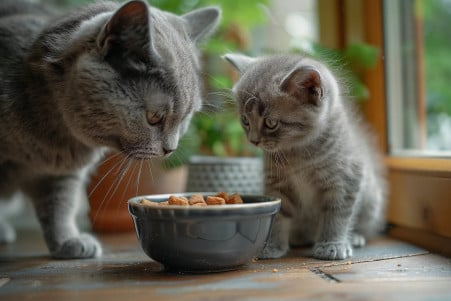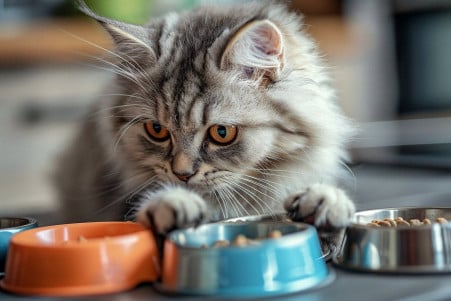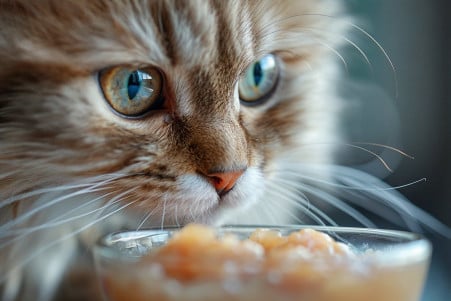Is It Okay for Adult Cats to Eat Kitten Food? Nutritional Needs at Different Life Stages
26 March 2024 • Updated 25 March 2024

One common question among cat parents is whether adult cats can eat kitten food. Kitten food is formulated with different nutrient levels to meet the needs of growing cats as opposed to those of fully grown cats. Although kitten food is higher in protein, calories, and other nutrients to support the rapid growth of kittens, adult cats can eat kitten food in moderation without any serious consequences, although it may cause them to gain weight if they eat too much of it.
Even though kitten food is not poisonous to adult cats, the differences in nutrients between kitten and adult cat food mean that there are some important things to consider when it comes to feeding cats as they age.
This article will review veterinary research to help you better understand the nutritional needs of kittens and adult cats, the potential effects of feeding cats kitten food in the long term, and the best ways to transition cats to adult cat food to ensure they get the nutrients they need at each stage of life.
Is it okay for adult cats to eat kitten food?
Nutritional Requirements: Kittens vs. Adult Cats
Kittens have very different nutritional requirements than adult cats because of their fast growth rate. According to IAMS, kittens need a calorie-dense diet that's high in nutrients like protein, fat, and minerals for the first 6 months of their lives to support their growth and development.
Kitten food has much higher levels of essential nutrients than adult cat food. According to Catster, kittens need 35-50% protein compared to 30% for adults, 18-35% fat compared to a moderate amount for adults, and specific calcium/phosphorus ratios of 2.5g/2.1g per 1000 calories to support the development of their bones and teeth. Kitten food also has more calories per serving to meet the higher energy needs of kittens.
Like kittens, adult cats are obligate carnivores, which means they need animal-based proteins and very few carbs in their diet. According to The Feline Medical Clinic, kittens are often started on wet food because of their small mouths and then weaned onto dry food.
Although it's OK for adult cats to eat kitten food occasionally, the higher calorie, protein, and fat content of kitten food doesn't meet the nutritional needs of adult cats.
Feeding kitten food to adult cats can lead to obesity and other health problems. Feeding cats food that's appropriate for their life stage ensures they get the nutrients they need to be healthy at every stage of life.
Risks of Feeding Kitten Food to Adult Cats
While kitten food isn’t toxic to adult cats, it does contain much higher levels of calories, protein, and fat than adult cats need. We Love Cats and Kittens says the high calorie content of kitten food can lead to obesity in adult cats if it’s fed to them on a regular basis.
Catster says kittens need 35-50% protein compared to 25-40% for adult cats, as well as higher fat and fatty acid content to support their rapid growth. This extra nutrition can lead to obesity and other health problems in adult cats that are less active.
For instance, a Purina article says overfeeding kitten food can lead to morbid obesity in adult cats, which increases their risk of diabetes and joint issues. It’s important to control portions and monitor food intake, especially for adult cats that live indoors or are less active.
To ensure adult cats maintain a healthy weight and overall health, they should be fed a diet that’s formulated for their life stage and activity level, not the higher calorie kitten formula. A veterinarian can help pet parents determine the best adult cat food and portion sizes for their cat.
When to Switch From Kitten to Adult Cat Food
According to 1800PetMeds, kittens should be switched to adult cat food at 12 months of age or when they have reached 90% of their expected adult weight. However, larger breeds like the Maine Coon may not reach full maturity until 18-24 months and may need to remain on kitten food for an additional 6-12 months.
Only Natural Pet suggests switching kittens to adult food when they have reached 80% of their expected adult weight, which is typically at 12 months for most breeds. This can be determined by weighing the kitten at 16 weeks and doubling the result.
The transition should be done over the course of 7-10 days, according to Purina and Cats.com, and should start with a mixture that contains 75% kitten food and 25% adult food. The amount of adult food in the mixture should be increased over the course of the transition period. Signs that a kitten is ready for the change include reaching their expected adult weight and a decrease in growth and activity.
It's important to choose a high-quality, nutrient-dense adult cat food to ensure a successful transition and proper nutrition after the kitten stage. A veterinarian can help determine the best time to make the switch and the best food for an individual cat.
Can You Feed Kitten Food to Senior or Geriatric Cats?
The nutritional needs of senior and geriatric cats differ from those of kittens, with lower calorie and protein requirements as cats age and become less active, according to Perfect Fit. That said, there are situations where a veterinarian might recommend feeding kitten food to an older cat.
According to Purina, if a senior cat is underweight or has a poor appetite, they may benefit from the higher protein and calorie content of kitten food. This can help ensure that the cat gets the extra nutrition they need to support their health, especially if they are recovering from an illness or injury.
The Arkansas Democrat-Gazette explains that veterinarians often use the terms "middle-aged" (7-10 years), "senior" (11-14 years), and "geriatric" (15+ years) to describe different life stages in cats. However, it's important to talk to your vet before making any changes to your senior cat's diet, as they may need a specialized diet based on their specific health conditions.
While there are situations where feeding kitten food to senior cats can be helpful, it should only be done under the supervision of a veterinarian, and it should be a short-term solution rather than a long-term diet. Instead, it's best to feed senior cats a diet that's appropriate for their age and formulated to meet their specific nutritional needs.
Expert Recommendations and Final Thoughts
The bottom line is that although adult cats can eat kitten food in moderation, it's not the best long-term option. Cats have different nutritional needs at different life stages, and feeding an adult cat a kitten formula can lead to weight gain and related health problems.
Kittens should be switched to adult cat food when they turn one year old, and the transition should be done gradually over a period of 7-10 days. It's important to work with a veterinarian, especially for senior cats or cats with specific health issues that may require dietary changes.
As cats age, owners should make sure to periodically assess their pet's nutritional needs and adjust their feeding routine as needed. Providing the right nutrition at each life stage is important for supporting a cat's overall health and quality of life.


